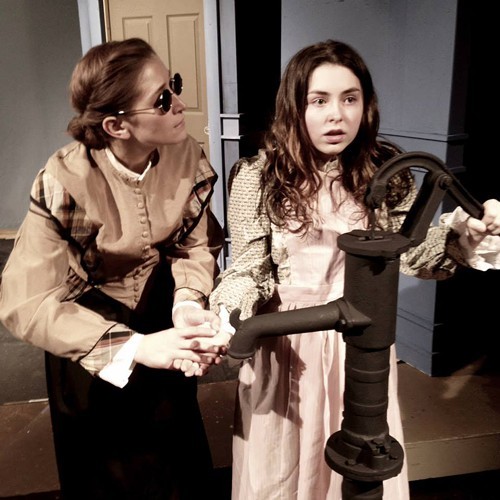The internet is full of meanness. One of the first viral videos I can remember watching was a clip from a community theater production of The Miracle Worker where the sighted actor playing the part of Helen Keller, who was blind, deaf, and mute, falls off the stage while pretending to be blind, deaf, and mute. The video’s still out there— EVERYWHERE— accumulating hits too. It’s awful. It’s mean. and it’s also funny as hell.
Don’t judge.
Thing is, when I watch the above-mentioned video, I’m not laughing at an actual impaired person. And I’m not really laughing at the gravitational misfortune of a child playing an impaired person either. I’m laughing at how simulacra can be so very troublesome. And I even suspect (and I am not alone) that the long tradition of Helen Keller jokes, as loathsome as they are, has a lot less to do with marginalizing real people who struggle to overcome great challenges, than with the ways we portray and fetishize disability in popular culture. I wade hip-deep into these treacherous waters in prelude to what some will surely perceive as an awful confession. Although nobody fell from the stage, The Germantown Community Theatre’s production of The Miracle Worker made me cringe occasionally, and it made me laugh in some inappropriate places. Here’s the crucial context: In spite of space limitations, and some directorial inconsistencies, It’s a pretty solid production. But a serious scene, like the one where Helen’s mother discovers that her infant daughter is blind and unresponsive, easily becomes titter-worthy when underscored with spooky soap opera/horror show music, and that music can make a performer’s acting choice seem wildly melodramatic, no matter how humane.
Ellen Saba is a strong choice for Mrs. Kate Keller. She is a grounding presence, and the play demands that of the character, who is, in many ways, a secondary protagonist, awakening to a woman’s place in the bellicose world of men. Sydney Bell, last seen at GCT as the bad seed in the musical Ruthless, and ShoWagon actor Lena Wallace are as good together as any two performers to tackle the iconic parts of Hellen Keller and Annie Sullivan. I’m not being especially original when I note that The Miracle Worker has always been a handful of great roles wrapped in a structurally messy melodrama. If Helen’s father Captain Keller occasionally sounds like Foghorn Leghorn wrote his dialogue, it’s hardly the fault of blustery actor Ken Mitten. That’s the part.
GCT’s cramped stage with its limited entrance and exit options aren’t helpful. The set is too literal and too inflexible to effectively account for locations as different as a house, a cabin, a school, and a train. And few experiences are more nerve wracking than watching actors playing visually impaired children awkwardly exiting by way of GCT’s narrow stage-front stairs. There were moments when I worried that this might be another viral video waiting to happen.
Director Marler Stone has some real personal experience with disability and with passionate teachers who work to give language to the hearing impaired. His aunt was deaf and his mother taught at the Mississippi School for the Deaf in Jackson. That might have something to do with why the scenes between Annie and Helen are so vivid and everything else is so fuzzy.
Weaker portions of The Miracle Worker become an accidental clown show. Captain Keller, for example, is a weak-willed blowhard still fighting the Civil War over dinner. He doesn’t really care if his daughter learns as long as she’s tamed, and his most corrosive decisions are born of a reflexive need to maintain traditional gender roles, and his belief that Annie Sullivan is a disrespectful girl with too much book learning but not enough sense. In contemporary terms the good Captain is a one man Tea Party, and a shining example of how reflexive, dogmatic Conservatism is always doomed because, by its very nature, it’s always stuck fighting old battles while the world turns, and everyone else moves on. The clownishness of the role is especially clear in productions such as this one, where family relationships are thinly established and Keller exists almost exclusively as Sullivan’s somewhat ridiculous nemesis.

Earlier I mentioned some over-the-top underscoring that turned a serious scene into an accidental hoot, and I’d like to come back to that for a minute. Marler Stone, who has really come into his own staging memorable productions of shows like Talley’s Folly and Death of a Salesman, has often turned to his son Matthew Stone to create original musical compositions to complement and comment on the dramatic material. It’s a good and admirable urge but results have been mixed, and in this scene they are just this side of catastrophic. The problem is mostly one of consistency since the music arises from nowhere to become a principal actor, and then it’s gone, and never again allowed to be more than fifth business. That same kind of inconsistency extends to so many elements of William Gibson’s script, and the production generally.
There’s a lot of meanness on the Internet. Hopefully, this review won’t add to the pile because the story of the Miracle Worker is no joke, and neither are the performances at the heart of this fine, if occasionally muddled production. But, as I mentioned, I did sometimes laugh in the wrong places. I’d only like to suggest, for others who may respond similarly, that, given the too-familiar material, and other circumstances, the occasional cringe or snort may not be quite as inappropriate as it seems. Plan on feeling guilty anyway.
The Miracle Worker closes this weekend. Details, here.
